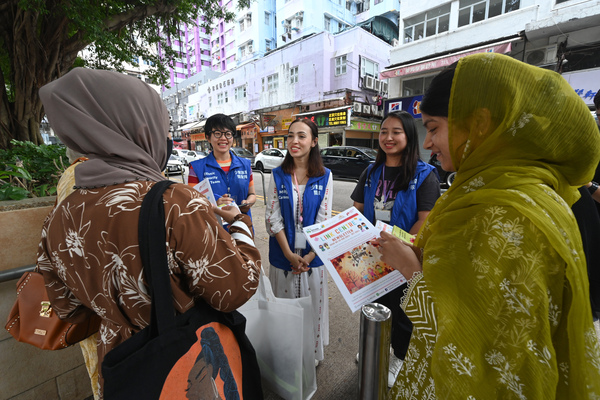Teams Connect With Minority Families

Kiran Fatima, who is of Pakistani descent, speaks a number of Pakistani languages – namely Urdu, Punjabi and Pashto – as well as English and some Cantonese.
Her knowledge of different languages helps her in her role as a member of the Ethnic Minority (EM) Care Team at the LINK Centre, one of the support service centres for ethnic minorities commissioned by the Government.
The establishment of EM Care Teams was announced in last year’s Policy Address, with each of the support service centres being tasked with setting up its own team. Eight teams were launched in July of this year, and each team is expected to assist at least 500 ethnic minority households annually through home visits or outreach activities.
Community support
Miss Fatima explained that after establishing contact with families through community networks, as well as referrals from the District Services & Community Care Teams (District Care Teams), the EM Care Teams visit ethnic minority households to connect with them, offer assistance, and disseminate important government messages. “A recent example is dissemination of the latest information on Typhoon Yagi to remind ethnic minorities to take precautionary measures.”
As EM Care Team members often speak the same languages and share similar cultural backgrounds to the ethnic minority families they visit, Miss Fatima believes they are well equipped to understand the needs of such households. Besides providing information about public services, welfare and medical services, and the services offered by District Care Teams and the support service centres for ethnic minorities, they can assist in referring cases to government departments or other organisations for follow-up, she added.
Tailored services
Mohammad Bilal, a father of four, has faced challenges as a parent, not least in relation to his youngest daughter’s behaviour. “It is hard for me and my wife to understand school problems like the kids’ homework and the kids’ school notices. I cannot help them,” he said.
After the family reached out to the LINK Centre, they were visited by its EM Care Team, whose members now help with translations of homework assignments and school notices. The team has also arranged play therapy sessions for his daughter at the centre.
“My wife also attended some parenting workshops offered by the LINK Centre, which were in English and designed to meet the needs of ethnic minorities,” Mr Bilal recounted, adding that the family were thankful to have received assistance from the centre in applying for the Mainland Travel Permits for Hong Kong & Macao Residents (non-Chinese Citizens).
Outreach efforts
LINK Centre person-in-charge Ann Tam revealed that the centre’s EM Care Team is led by one social worker and three programme workers who are all familiar with ethnic minority languages and cultures. It also recruits ethnic minorities as volunteers, and provides basic training for them in areas such as how to conduct effective home visits.
Miss Tam explained that the care team’s services are promoted at street booths and through visits to places where ethnic minorities gather. “We work closely with the District Offices and District Care Teams,” she added. “Whenever the District Care Teams encounter problems or difficulties when serving ethnic minorities, they could refer the cases to us for further follow-up.”
More service centres
Excluding foreign domestic helpers, around 300,000 people from ethnic minority groups currently reside in Hong Kong. The Home Affairs Department has adopted a multi-pronged approach to supporting their integration into the community.
Assistant Director of Home Affairs Wilson Kwong outlined that the department provides a variety of services for ethnic minorities through the eight support service centres. These services include language classes, integration programmes, counselling services, referral services, and more.
One of the eight centres, the CHEER Centre in Kwun Tong, also provides instant telephone translation services in eight minority languages to facilitate access to public services. “These centres provide services to over 100,000 service recipients every year, and we will set up two more centres by the end of this year. One is in Kowloon Central and the other one is in New Territories East, bringing the total number of centres to 10.”
Mr Kwong added that the department has regularised the enhanced services to youth and newly arrived ethnic minorities. It will also continue to implement the “District-based Programme for Racial Harmony”, which includes organising activities at the district level to facilitate communication and interaction between ethnic minorities and the wider community.
New Hub Helps Green Tech To Flourish
Last month, the Hong Kong Science & Technology Parks Corporation, or HKSTP, transformed its InnoCentre in Kowloon ... Read more
MICE Tourism Gains Momentum
Ballroom inspections and mahjong sessions may not be what automatically springs to mind when you consider Hong Kong’... Read more
Game Startups Reach New Level
The global video game industry is highly competitive, requiring effective marketing for success. The Hong Kong Game En... Read more
Breast Milk Donations Save Lives
Last April, Ida Chan welcomed her son into the world. He was born a kilogramme lighter than expected, and Ida decided ... Read more
HK Reaches For The Moon
The beauty and mystery of the Moon have captivated the human imagination for millennia. Channelling that fascination i... Read more
Creating Disability-inclusive Jobs
Nestled in the Museum of the War of Resistance & Coastal Defence, Madam Hong Cafe enjoys the spectacular views of ... Read more

